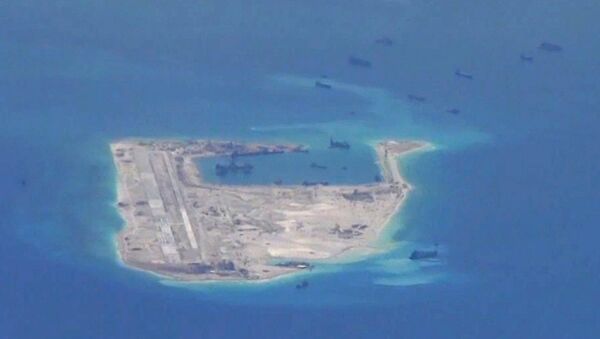China continues to cement its presence on the disputed Spratly Islands with the most recent reported, but unconfirmed move of installing land-based cruise anti-ship and surface-to-air missile systems. According to an anonymous CNBC source, Beijing has been deploying them for the last 30 days.
US Admiral Philip Davidson, who was recently nominated head of the US Pacific Command had earlier stated in his written testimony to the US Senate on April 24, 2018 that "forward operating bases" were nearly complete with the only missing element being the deployed forces. According to the admiral, when done, China will be able "extend its influence and project power" deep into Oceania.
READ MORE: Beijing Deploys Cruise Missiles on Islands in South China Sea — Reports
Greg Poling, a South China Sea expert at Washington's Center for Strategic and International Studies think tank noted that if the recent deployment is true, they will be first missiles on the Spratly Islands. According to him, this deployment moves China closer to dominating the South China Sea.
"Before this, if you were one of the other claimants […] you knew that China was monitoring your every move. Now you will know that you're operating inside Chinese missile range. That's a pretty strong, if implicit, threat," Poling said.
He also noted that the move was not unexpected, as China has already deployed similar missiles north of Spratly, on Woody Island.
Bonnie Glaser, the head of the China Power Project at the Center for Strategic and International Studies (CSIS) think tank said that it's unclear for her, why Beijing chose such timing for the deployment.
"I'm not convinced there was any particular trigger […] The Chinese are on their own timing for when they want to do these things," she said.
Glaser also noted that Beijing knows regional powers and even the US have being expecting such a deployment and figured they could act now feeling the reaction of other powers would be moderate. She added that the fact that all eyes are now set on North Korea only helps China in this situation.
"They think they can get away with it and they are probably right […] China continues to expand their control over the air and sea in the South China Sea," Glaser said.
According to her, the next most likely step will be the deployment of fighter jets to the islands and conduction of military drills using the forces deployed there.
READ MORE: China Much More Able to Handle Trade War Than US — Official
Song Zhongping, a former member of China's artillery corps and a military commentator for Phoenix Television in Hong Kong, said that the US freedom of navigation operations (FONOPs) patrols in the region are the key reason behind the deployment of missiles. According to him FONOP challenges "China's sovereignty and historical domination in the region."
"In order to protect its national interests and its belt and road [initiative] Beijing needs to strengthen its military build-up in the Spratly and Paracel archipelagos so that its navy and air force can go further afield," Song Zhongping added.
China officials have not commented on the news about their deployment of missiles to the Spratly Islands, but noted that all its military facilities there are purely defensive. The US Department of Defense has refused to comment on the situation in the South China Sea saying that the department doesn't "comment on matters of intelligence."


